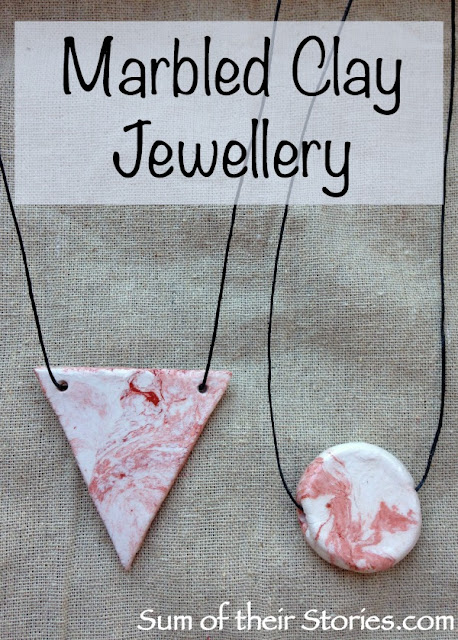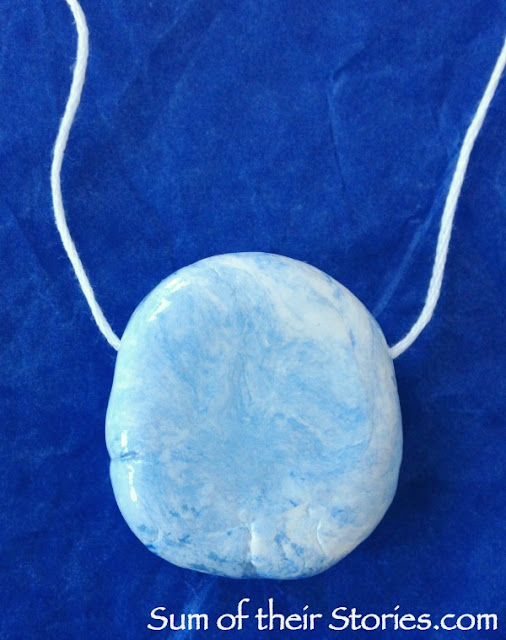|
|
|
|
Thursday, 29 December 2016
Marbled Clay Jewellery
December 29, 2016
Air hardening clay makes it easy to make things from clay at home.
I'll be linking up at these great link parties,
This post contains affiliate links
Cass Art sent me some Air hardening clay and marbling medium to try out and review as part of their upcoming #BEINSPIRED campaign.
In the package I had pack of DAS air hardening clay, 2 packs of DAS Idea Mix marbling material in Verona Red and Sodalite Blue, a bottle of Vernidas Vitrifying Varnish and a DAS adjustable rolling pin, all in a lovely reusable Cass Art tote bag. The rolling pin has clever rubber rings so you can easily adjust the thickness of whatever you are rolling.
I've made a whole load of things from this 1kg pack of clay which I'll share over time, but I thought I'd start with this simple marbled jewellery.
Before you begin get everything ready that you will need. This clay dries in the air, which means it starts to dry as soon as it comes out of the packet!
Have a little pot of water handy as you can damp your fingers to make the clay more workable. I wouldn't make it too wet though, I found it slippery and difficult to handle if I made it too wet.
Marbling the clay is pretty easy. You break off a big lump of the air hardening clay, knead it a little to soften it then add some smaller blobs of the marbling mix.
Just knead it and roll it, repeating a couple of times and a random marbled effect just appears. Don't knead and re roll too many times though or the effect starts to disappear and the clay turns a pale blue (or red, or whatever colour you are adding)
I tried out both the red and blue, you can see my photos here switch between the two.
Once your clay is marbled you are ready to begin making your jewellery shapes.
For the triangle pendant I rolled the clay out leaving the largest rubber ring on, that leaves the clay 5mm thick.
I made a paper template of a triangle 6cm(2.25'") x 6cm(2.25"), laid it on the clay and then cut round it. I tried my x-acto knife and just a regular kitchen knife. Both cut the clay just fine so either will work. I also tried just using my cutting mat or rolling out the clay on a piece of baking parchment. The baking parchment did make it easier to lift the clay shapes up, but it did make it a bit slippery to roll out so swings and roundabouts with that. Try it out, see which you prefer.
If your shapes have little rough bits like mine on the left, just wet your finger with a drop of water then smooth the clay down. You can pick the pieces up and handle them carefully, so you can smooth all the sides. Apparently you can sand this clay once it's dry but it seemed easier to me to smooth it at this stage.
Then make holes for the cord. I used a wooden kebab skewer. Poke the skewer in from the front and then again from the back, giving it a bit of a wiggle to make sure no little lumps of clay get stuck inside.
Now the difficult part, you just leave then for about 24 hours to dry and harden. (Oh and wash your knives, rolling pin, board etc now, hot soapy water works fine)
You can see here how the white clay lightens as it dries. The marbling mix colours stayed pretty much the same.
It takes between 12 and 48 hours for everything to completely dry and harden, depending on the thickness. The mini bunting pieces dried really quickly, the fatter beads took longer. Once they are dry the pieces will feel much lighter too.
Then you can varnish to protect the clay and to give a glossy finish. The Vitrifying varnish gives an amazing high shine, it really is a glass like finish. Just brush it on one side at a time, giving it time to dry in between. I found any brush marks just smoothed themselves out so no need to fuss over them.
It's not a great photo but you can see the high gloss on the left v the matt look before varnish on the right.
To make these flattened beads, just roll a lump of clay into a ball, poke your wooden kebab skewer through either in the centre or just a little above centre then flatten very lightly with the rolling pin.
Looking at this photo below of the finished blue pebble pendant I think I should have spent just a little longer smoothing the clay at the bottom before I left it to dry and harden. It's a little bit too creasy for my liking, although in nature pebbles to have cracks and crevices in them. Maybe subliminally I was going for a natural effect!
This little bunting necklace was made in the same way as the triangle pendants but on a much smaller scale.
The clay was rolled out to 3.5mm (the middle rubber ring on the rolling pin) and much smaller triangles cut out. I tried mixing a little of my marbled mix into a fresh lump of the red Idea Mix to give a reversed marble effect for some of the triangles.
The little holes for the jump rings I made with cocktail sticks.
Originally I thought I would join each piece of bunting with a single oval jump ring but they just didn't fit.
You can see what I mean on this page from my little note book (where I make notes and sketch ideas that may or may not ever happen)
I ended up adding a little round 7mm jump ring to each side of the bunting triangles then joined them up with another jump ring.
This way the triangles lie flat, if I'd joined the triangles directly to one another the whole thing would twist.
Part of Cass Art's #BEINSPIRED campaign is to share where inspiration comes from. Normally for me it's Pinterest, magazines, books, TV, looking out of the window..... anything really. With this marbled clay I originally set off thinking I was going to create clay pebbles to turn into beads. As the marbling effect starts to appear in the lump of clay it does feel like you are holding a large, cold, slightly wet pebble. But as I was experimenting I thought it would be fun to try geometric shapes, to contrast completely with the natural stone effect of the marbling. Triangles are such a simple shape to begin, but I would like to try the hexagon, or maybe the triangle split into 3 from my note book when I have time.
Have you ever tried using air hardening clay? It was much simpler to work with that I was expecting and the glossy varnish gives the pieces a lovely expensive finish. I've really enjoyed playing with it and have quite a few more projects to share with you later on.
You might also be interested in:

Sum of their Stories
Hello, I'm Julie. I love making things and this is where I share my enthusiasm.
you may also like
Subscribe to:
Post Comments (Atom)
Labels
Air Hardening Clay
Blogging
Christmas
Clever ideas
Craft show
Crochet
Doctor Who
Easter
Felt
Geekery
Gift Wrap
Gifts
Hand Lettering
Handmade Monday
Home Decorating
Kids activities
Knitting
My Favourite Finds
Needle case
Party ideas
Pattern review
Pinterest Challenge
Sewing my Stash
Silent Sunday
Valentine
Wedding
accessories
art
bags
buttons
cakes
cooking
cushions and pillows
doodle
embroidery
gardening
gift ideas
greeting cards
jewellery
organising ideas
papercraft
papercutting
pretty ideas
recipes
recycling/repurposing
refashion
sewing
their stories
thrifty tips
tutorials
what can go wrong















































Hey these looks great! I love your sketches too.
ReplyDeleteThanks Caroline, just a little peak into my notebook! It's not very tidy, hence it's just a little peak!
DeleteMy daughter would enjoy making clay jewelry with these supplies! We attempted to make beads once before but I don't think we let them dry long enough.
ReplyDeleteIt's perfect for older kids to make things with. Just keep it in a zip lock bag wen you are not using it.
DeleteI found the pieces dried pretty quickly but I did make sure they were thoroughly dry before varnishing them, I didn't want to seal any moisture in! Enjoy, if you have another go. I found it a fun craft to try.
So pretty, did not know how to make the marbled effect, all clear now thank you. Have a great week x
ReplyDeleteThanks Carol, the marble just sort of happened, which was great! The clay comes with a little 'how to' sheet too with some hints and tips.
DeleteWhat a lovely set of materials to be sent - the varnish really changes the finish. I love the detail on the rolling pin to check the depth of the rolled clay.
ReplyDeleteThe rolling pin is clever isn't it Vicky?
DeleteThe varnish really brings out the marble effect and colours, it seems to make the pieces look much more expensive and less homemade too.
Wow DAS clay. I remember using it as a child, so it must have been going for a long time. Looks better than I remember.
ReplyDeleteI remember my kids making stuff from this at school when they were little with mixed results! I found it really easy to use and the finished pieces are more sturdy than I remember the kids bits being. Maybe the formula they use is improved nowadays. People are always tweaking their mixes aren't they - usually for the better!
DeleteThese are great Julie. They look beautiful. Very creative!!
ReplyDeleteThanks for sharing at Creative Mondays, you will be one of my features later when this weeks blog hop opens :)
Thanks Claire, that's lovely news.
DeleteThat is a beautiful project !! love the creativity ! im currently doing some clay projects of my own .
ReplyDeleteIm having trouble using the Vernisdas varnish gloss , is there a method to use it ? The vernidas varnish that i bought is similar to a glue consistency ( is that even how it should be? ) , so it turns so pathchy and its hard for me to even it out using the brush .
Hi Fathinah, I'm so pleased you like my jewellery.
DeleteThe varnish is quite gloopy, like a thick treacle, but I found it spread easily with a brush as long as I was quite quick. For the tiny pieces I just dipped the brush into the bottle, wiped the excess off on the rim and then spread it quickly. The brush marks just disappeared over the next minute or so.
For the larger pieces I put the brush straight into the bottle again but didn't wipe off any excess, I just dolloped it all onto the clay and then brushed it out as quickly as possible.
I did give my Cone ring keeper http://www.sumoftheirstories.com/2017/01/marbled-clay-ring-keeper.html two coats until it was properly covered but I didn't have any problems with it being patchy, in fact I found it smoothed itself out nicely.
I was working in a warm room, I wonder if cold would make it less easy to spread?
All I can suggest is - be quick and do several thinner layers if possible.
Good luck, I hope that helps.